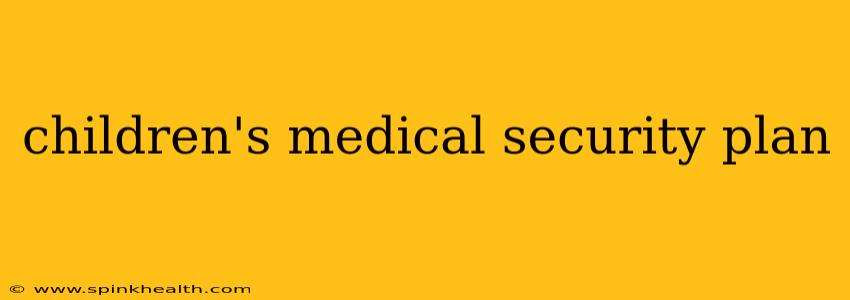The arrival of a child brings immense joy, but also a surge of responsibilities, not least of which is ensuring their health and well-being. One of the most crucial aspects of responsible parenthood is securing a comprehensive medical security plan for your little one. This isn't just about having insurance; it's about understanding the options, choosing the right coverage, and navigating the complexities of the healthcare system to provide the best possible care for your child. Let's embark on this journey together.
What is a Children's Medical Security Plan?
At its core, a children's medical security plan is a system of financial protection designed to cover the costs of your child's medical care. This can encompass a wide range of services, from routine check-ups and vaccinations to emergency room visits and specialized treatments. The plan's specifics vary greatly depending on the type of coverage and the provider. Some plans are offered through employers, while others are purchased directly from insurance companies or through government programs like Medicaid and CHIP (Children's Health Insurance Program).
What are the Different Types of Children's Health Insurance Plans?
Understanding the different types of plans available is crucial for making an informed decision. The main categories are:
-
Employer-Sponsored Insurance: Many employers offer health insurance as part of their benefits package. These plans often provide comprehensive coverage but vary widely in their premiums, deductibles, and co-pays. It's vital to carefully review the plan details to ensure it meets your family's needs.
-
Medicaid: This is a government-funded health insurance program for low-income individuals and families. Eligibility requirements vary by state, but Medicaid generally covers a wide range of medical services for children.
-
CHIP (Children's Health Insurance Program): CHIP is another government program that provides low-cost health coverage to children in families that earn too much to qualify for Medicaid but cannot afford private insurance. This is a vital safety net for many families.
-
Private Health Insurance: These are plans purchased directly from insurance companies. They offer a wide range of options, from basic coverage to comprehensive plans with extensive benefits. However, private insurance plans can be expensive, and it's crucial to compare different plans carefully before selecting one.
How Much Does Children's Health Insurance Cost?
The cost of children's health insurance varies drastically depending on several factors:
-
Type of plan: Government-sponsored plans like Medicaid and CHIP are generally much more affordable than private insurance plans.
-
Family income: Private insurance premiums often increase with family income.
-
Location: The cost of insurance can vary significantly based on geographic location.
-
Plan features: Plans with lower premiums may have higher deductibles and co-pays.
It's crucial to get quotes from multiple insurers and carefully compare the costs and benefits before making a decision. Many online comparison tools can simplify this process.
What Does a Typical Children's Health Insurance Plan Cover?
Most comprehensive children's health insurance plans cover a broad range of services, including:
- Well-child visits: Routine check-ups and vaccinations.
- Hospitalizations: Inpatient care for illnesses and injuries.
- Surgery: Surgical procedures for various conditions.
- Prescription drugs: Medications prescribed by a doctor.
- Mental health services: Care for emotional and behavioral conditions.
Specific coverage details vary by plan, so it's essential to review the policy carefully.
What Happens if My Child Needs Specialized Care?
Many children's health insurance plans cover specialized care, such as treatment for chronic conditions or developmental delays. However, the extent of coverage and the associated costs can vary significantly. It's crucial to understand the details of your plan's coverage for specialized services before your child needs them. This might involve contacting your insurer directly to inquire about specific treatments or procedures.
How Do I Choose the Right Children's Medical Security Plan?
Choosing the right plan is a significant decision that requires careful consideration. Here are some key factors to consider:
-
Cost: Balance the premium cost with the level of coverage and potential out-of-pocket expenses.
-
Coverage: Ensure the plan covers the services your child is likely to need.
-
Network of providers: Choose a plan with a wide network of doctors and hospitals in your area.
-
Customer service: A responsive and helpful customer service team can make a significant difference.
Remember, choosing the right plan is a personal decision based on your family's unique needs and circumstances. Don't hesitate to ask questions and seek advice from healthcare professionals or insurance brokers.
Securing a comprehensive children's medical security plan is a critical step in ensuring your child's health and well-being. By understanding your options, comparing plans carefully, and asking questions, you can make an informed decision that provides your child with the best possible care. Your child's health is priceless, and investing in a robust medical security plan is an investment in their future.

